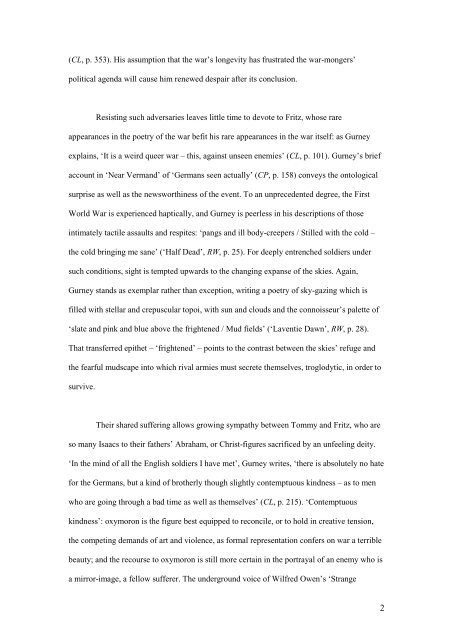Gurney and Fritz.pdf - Exeter Research and Institutional Content ...
Gurney and Fritz.pdf - Exeter Research and Institutional Content ...
Gurney and Fritz.pdf - Exeter Research and Institutional Content ...
Create successful ePaper yourself
Turn your PDF publications into a flip-book with our unique Google optimized e-Paper software.
(CL, p. 353). His assumption that the war’s longevity has frustrated the war-mongers’<br />
political agenda will cause him renewed despair after its conclusion.<br />
Resisting such adversaries leaves little time to devote to <strong>Fritz</strong>, whose rare<br />
appearances in the poetry of the war befit his rare appearances in the war itself: as <strong>Gurney</strong><br />
explains, ‘It is a weird queer war – this, against unseen enemies’ (CL, p. 101). <strong>Gurney</strong>’s brief<br />
account in ‘Near Verm<strong>and</strong>’ of ‘Germans seen actually’ (CP, p. 158) conveys the ontological<br />
surprise as well as the newsworthiness of the event. To an unprecedented degree, the First<br />
World War is experienced haptically, <strong>and</strong> <strong>Gurney</strong> is peerless in his descriptions of those<br />
intimately tactile assaults <strong>and</strong> respites: ‘pangs <strong>and</strong> ill body-creepers / Stilled with the cold –<br />
the cold bringing me sane’ (‘Half Dead’, RW, p. 25). For deeply entrenched soldiers under<br />
such conditions, sight is tempted upwards to the changing expanse of the skies. Again,<br />
<strong>Gurney</strong> st<strong>and</strong>s as exemplar rather than exception, writing a poetry of sky-gazing which is<br />
filled with stellar <strong>and</strong> crepuscular topoi, with sun <strong>and</strong> clouds <strong>and</strong> the connoisseur’s palette of<br />
‘slate <strong>and</strong> pink <strong>and</strong> blue above the frightened / Mud fields’ (‘Laventie Dawn’, RW, p. 28).<br />
That transferred epithet – ‘frightened’ – points to the contrast between the skies’ refuge <strong>and</strong><br />
the fearful mudscape into which rival armies must secrete themselves, troglodytic, in order to<br />
survive.<br />
Their shared suffering allows growing sympathy between Tommy <strong>and</strong> <strong>Fritz</strong>, who are<br />
so many Isaacs to their fathers’ Abraham, or Christ-figures sacrificed by an unfeeling deity.<br />
‘In the mind of all the English soldiers I have met’, <strong>Gurney</strong> writes, ‘there is absolutely no hate<br />
for the Germans, but a kind of brotherly though slightly contemptuous kindness – as to men<br />
who are going through a bad time as well as themselves’ (CL, p. 215). ‘Contemptuous<br />
kindness’: oxymoron is the figure best equipped to reconcile, or to hold in creative tension,<br />
the competing dem<strong>and</strong>s of art <strong>and</strong> violence, as formal representation confers on war a terrible<br />
beauty; <strong>and</strong> the recourse to oxymoron is still more certain in the portrayal of an enemy who is<br />
a mirror-image, a fellow sufferer. The underground voice of Wilfred Owen’s ‘Strange<br />
2
















